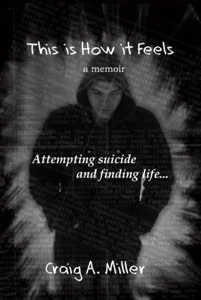This is How it Feels
A memoir of attempting suicide and finding life
At twenty-years-old, Craig Miller attempted to end his own life. He sat on the edge of a rented bed and swallowed two hundred and fifty pills. He lay back and closed his eyes, never imagining that a note he wrote to himself fourteen years earlier would be what would save his life. That note, written across the creases of a tear stained paper, read, “Don’t ever forget how this feels.”
From the time he was six-years-old, Craig lived his life by those words. He believed that if he needed to remember the feelings behind his life’s most significant events, then there must be a reason why they happened. And for three extraordinary days following his suicide attempt, as he lay in the Intensive Care Unit floating in and out of consciousness, he found those reasons.
He relived days from his childhood when his only friend became his assailant. He relived years of building a troubled and misguided relationship with God when he prayed to be saved from a violent and broken home. He remembered when the pain of his life’s tragedies finally caught up to him. He lost the only person he had ever loved and became the victim of severe obsessive compulsive disorder, relentless anxiety, and devastating irrational fear.
After each memory, he awoke to the blurred reality of his suicide attempt. The struggle to fight his childhood assailant became a battle with nurses and doctors who worked to restrain him to a hospital bed. The pain from a fist to his nose became the sting of a tube as it was pushed down his throat by the medical staff. And the memory of freezing alone on a cold winter night became the reality of a dark, lonely hospital room. But more importantly, after each memory ended, Craig was left with the feeling that remained from reliving it. He felt the imprint it left within him- the desire to love, the need to change, and the will to fight.
Craig Miller lay in a hospital bed for three days while his body fought for life, but his soul stood undecided on the threshold of existence. He relived the most pivotal moments of his life and saw himself from an entirely new perspective. He learned that God does not punish, and that love, no matter how bad it hurts, is worth it. He learned that compassion is to see the hurt in the eyes of another, no matter how bad we hurt ourselves. He learned that living in the darkness of mental illness can be one of the most powerful paths to self-discovery. And he learned that there are, in fact, reasons for everything. But above all, Craig learned that life, no matter how hard it gets, is worth living.
From the time he was six-years-old, Craig lived his life by those words. He believed that if he needed to remember the feelings behind his life’s most significant events, then there must be a reason why they happened. And for three extraordinary days following his suicide attempt, as he lay in the Intensive Care Unit floating in and out of consciousness, he found those reasons.
He relived days from his childhood when his only friend became his assailant. He relived years of building a troubled and misguided relationship with God when he prayed to be saved from a violent and broken home. He remembered when the pain of his life’s tragedies finally caught up to him. He lost the only person he had ever loved and became the victim of severe obsessive compulsive disorder, relentless anxiety, and devastating irrational fear.
After each memory, he awoke to the blurred reality of his suicide attempt. The struggle to fight his childhood assailant became a battle with nurses and doctors who worked to restrain him to a hospital bed. The pain from a fist to his nose became the sting of a tube as it was pushed down his throat by the medical staff. And the memory of freezing alone on a cold winter night became the reality of a dark, lonely hospital room. But more importantly, after each memory ended, Craig was left with the feeling that remained from reliving it. He felt the imprint it left within him- the desire to love, the need to change, and the will to fight.
Craig Miller lay in a hospital bed for three days while his body fought for life, but his soul stood undecided on the threshold of existence. He relived the most pivotal moments of his life and saw himself from an entirely new perspective. He learned that God does not punish, and that love, no matter how bad it hurts, is worth it. He learned that compassion is to see the hurt in the eyes of another, no matter how bad we hurt ourselves. He learned that living in the darkness of mental illness can be one of the most powerful paths to self-discovery. And he learned that there are, in fact, reasons for everything. But above all, Craig learned that life, no matter how hard it gets, is worth living.
GRIT: Unsaid, Unseen, Unsung

GRIT, a companion book to This is How it Feels, is available now on Amazon.
The greatest lesson I’ve ever learned in life is the need for balance. Balance of the mind and balance of the heart, or to take it a step further, trust and belief. I think trust is something that happens in our minds. Its measurable, it’s predictable, it’s scientific. We trust in the things in which we can rightly determine the outcome of. But belief? Belief is different. Belief happens in our hearts. Belief is immeasurable, it’s unpredictable. In fact it’s nearly impossible to describe. Belief is more like an emotion. We feel belief. Maintaining the balance of these two critical aspects of me has proven to be the most difficult thing I have ever done.
I lived most of my life in a sever state of imbalance. I was eight years old the first time I considered suicide. I struggled with mental health issues from my earliest memories. I was molested for several years of my childhood. I grew up in a broken home, I was bullied at school. My mind was overrun with anxiety, depression, obsessive compulsive disorder and a constant state of overwhelming fear. I was taught from the start that life hurts. I could not trust in it.
But for everything my mind struggled with, my heart did not. I believed that there was purpose for all things. I believed that there was meaning, and reason, and significance to our life’s events. And I believed, with my whole heart, that no matter how hard it got, life was worth living. But despite this belief life continued to worsen, and I slowly began to lose faith that things would improve. My mind had always lacked trust. But it wasn’t until my heart gave up on belief that I lost my fight.
At twenty years old I attempted suicide.
In waking from my attempt I made a commitment to myself to continue this life despite any challenge I may face. I worked to mend a mind that for so long had never allowed me to trust in life. And I worked to fill my heart with a belief that there is meaning in even the darkest of our life’s events.
Grit is a collection of writings and photographs I have created over the years. It documents my struggles with mental health issues, God, love, passion, and the inner battle I have always fought to continue on. Grit is unfiltered. There are poems that read like suicide notes, riddled with fear, anger and resentment. There are images that are dark and chaotic. But ultimately there are writings and photographs filled with hope. Grit is my journey through art. It is raw, painful, thought provoking and beautiful. It is where the belief that there is meaning and reason for all things in life balances with the trust that those reasons are simply to teach us something about ourselves and the lives we live. Grit is my heart and mind working together to achieve the greatest lesson I’ve ever leaned in life: the need for balance.
The greatest lesson I’ve ever learned in life is the need for balance. Balance of the mind and balance of the heart, or to take it a step further, trust and belief. I think trust is something that happens in our minds. Its measurable, it’s predictable, it’s scientific. We trust in the things in which we can rightly determine the outcome of. But belief? Belief is different. Belief happens in our hearts. Belief is immeasurable, it’s unpredictable. In fact it’s nearly impossible to describe. Belief is more like an emotion. We feel belief. Maintaining the balance of these two critical aspects of me has proven to be the most difficult thing I have ever done.
I lived most of my life in a sever state of imbalance. I was eight years old the first time I considered suicide. I struggled with mental health issues from my earliest memories. I was molested for several years of my childhood. I grew up in a broken home, I was bullied at school. My mind was overrun with anxiety, depression, obsessive compulsive disorder and a constant state of overwhelming fear. I was taught from the start that life hurts. I could not trust in it.
But for everything my mind struggled with, my heart did not. I believed that there was purpose for all things. I believed that there was meaning, and reason, and significance to our life’s events. And I believed, with my whole heart, that no matter how hard it got, life was worth living. But despite this belief life continued to worsen, and I slowly began to lose faith that things would improve. My mind had always lacked trust. But it wasn’t until my heart gave up on belief that I lost my fight.
At twenty years old I attempted suicide.
In waking from my attempt I made a commitment to myself to continue this life despite any challenge I may face. I worked to mend a mind that for so long had never allowed me to trust in life. And I worked to fill my heart with a belief that there is meaning in even the darkest of our life’s events.
Grit is a collection of writings and photographs I have created over the years. It documents my struggles with mental health issues, God, love, passion, and the inner battle I have always fought to continue on. Grit is unfiltered. There are poems that read like suicide notes, riddled with fear, anger and resentment. There are images that are dark and chaotic. But ultimately there are writings and photographs filled with hope. Grit is my journey through art. It is raw, painful, thought provoking and beautiful. It is where the belief that there is meaning and reason for all things in life balances with the trust that those reasons are simply to teach us something about ourselves and the lives we live. Grit is my heart and mind working together to achieve the greatest lesson I’ve ever leaned in life: the need for balance.




